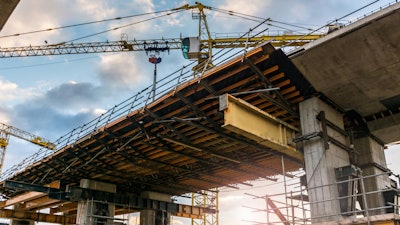
President Joe Biden signed the $1.2 trillion infrastructure bill into law on Nov. 15.
The legislation was passed to invest in the nation's infrastructure, including funding for roads and bridges, rail, transit, ports, airports, the electric grid, water systems and expanded broadband.
Eric Hoplin, National Association of Wholesaler-Distributors (NAW) CEO, stated that “this legislation will help the wholesale distribution industry more efficiently move goods and materials across the country, benefitting both American businesses and consumers. Bipartisan collaboration results in great achievements for our country, and this investment in infrastructure is a victory for all Americans.”
The building and construction materials subsegment of the wholesale distribution industry and other parts of the infrastructure supply chain will likely be beneficiaries of the legislation. Distributors of construction and building materials, steel, machinery, and equipment, electrical and plumbing, wireless and telecom materials should all benefit by upgrading existing US infrastructures and supporting a transition to cleaner energy.
Wholesaler distributors aligned with these product categories will need to secure the talent, technology, and distribution capacity to fully benefit from their participation in this new infrastructure spending.
The wholesale distribution industry has historically lagged other industries in embracing digital technology to improve operations and realize efficiencies. Distributors now need to deploy tools to increase productivity, improve efficiency, and reduce costs on major infrastructure-related projects.
New and emerging digital supply chain technologies will be a huge part of the solution to take advantage of infrastructure bill opportunities. Digital technology innovations are displacing traditional ways of planning, buying, warehousing, selling, delivering, and accounting for infrastructure project-related opportunities.
Project management is just one example of how digital technology can be beneficial during infrastructure improvement projects. It can help distributors manage projects from a centralized repository and keep project support on track, from forecasting and planning to accounting and closure.
Project management technology can improve planning, monitoring, and control of material by creating cost and revenue plans and help establish transparent processes to record project demand deviations and determine the material and financial impact of changes.
Improving the US infrastructure, including roads, bridges, railways, and ports that provide our supply chain network, will benefit durable goods distributors and create demand for new talent and technology, including supply chain and project management.
 Pretko
Pretko
Paul Pretko is a wholesale distribution industry executive advisor at SAP. He is an enterprise technology and operations leader with over thirty-five years of comprehensive experience in logistics and distribution environments, executing operational improvement strategies through technology. He focuses on enabling operational excellence and profitable growth with SAP solutions for wholesale distribution. For more information on how wholesale distributors can expand beyond traditional industry boundaries and become a proactive, insight-driven distributor click here.






















